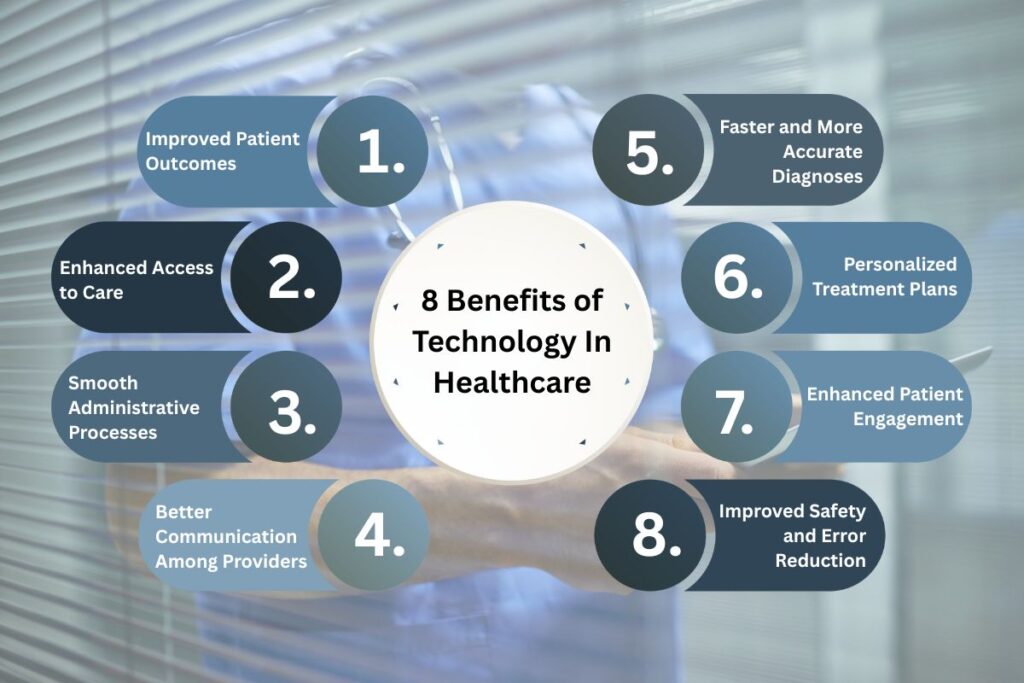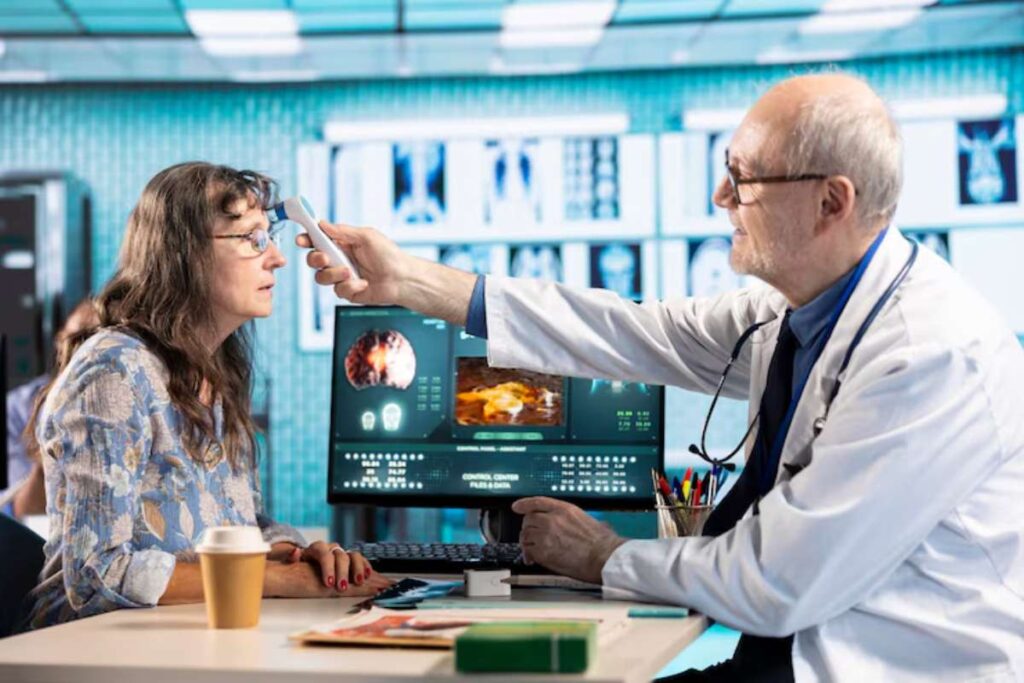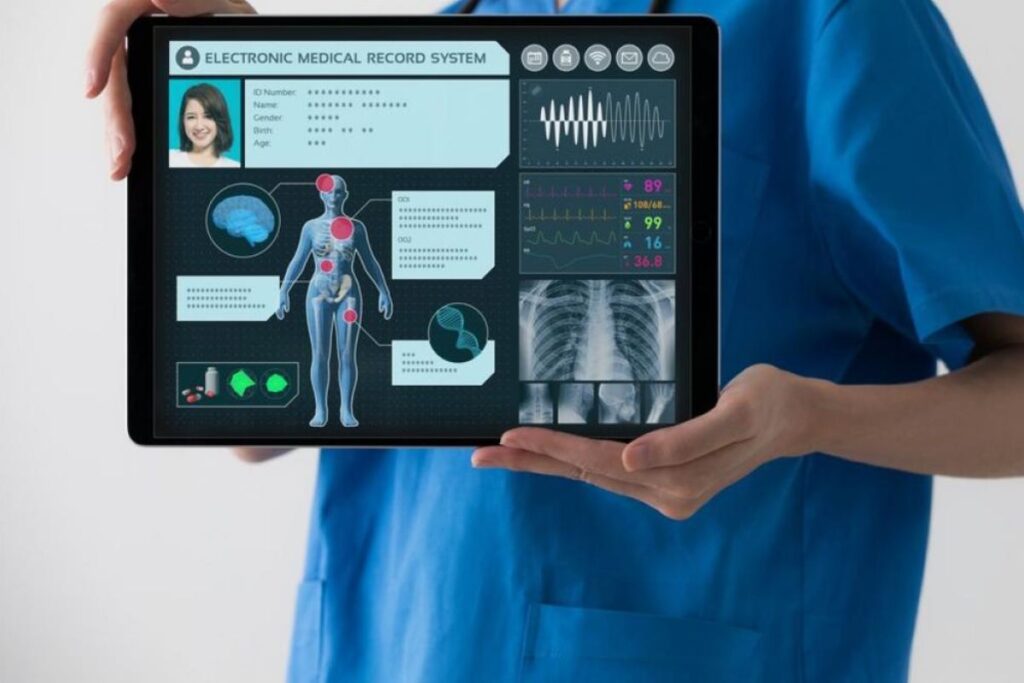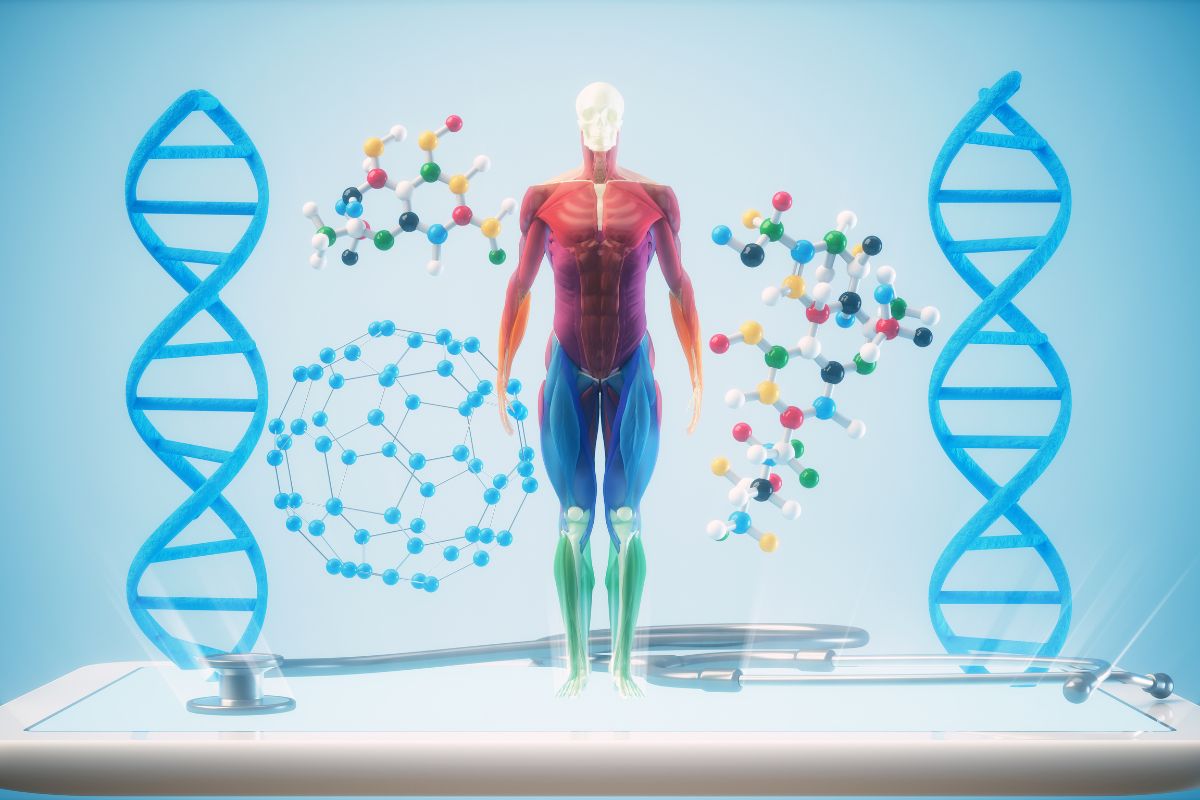In the past few years, many industries saw immense changes across various aspects of their domains. Few transformations have been exceptional due to technological advancements. Technology has completely changed the healthcare industry in many different ways.
Hospitals are not a place of comfort. For many, just stepping into a clinic can trigger anxiety, often making recovery more complicated than it needs to be. However, integrating technology in healthcare has changed the whole concept of patient care. With the help of technology, the healthcare sector has come up with efficient treatments, reducing procedural anxiety and improving recovery outcomes. For instance, AI-assisted diagnostics and wearable devices are helping monitor live vitals, and telemedicine platforms provide expert care.
As new technologies emerge and existing systems evolve, the focus remains on improving the quality of care, increasing accessibility, and lowering costs. In this article, we will discuss some of the benefits of technology in healthcare, its varied applications and types, and how it will change the future of medicine.
What is Healthcare Technology?
Healthcare technology refers to using various tools, systems, and platforms that enhance the delivery, management, and monitoring of health services. It includes everything from electronic health records (EHRs) and remote patient monitoring devices to AI-driven diagnostics and robotic-assisted surgeries.
These technologies aim to improve medical procedures, accuracy in diagnosis and treatment, and provide better access to care for all patients, regardless of location or financial ability. Its main aim is to offer advanced tools for providers to help them produce better outcomes. Integrating technology into healthcare also significantly boosts patient safety and minimizes human error. The benefits of technology in healthcare aren’t confined to the theoretical aspect; instead, many institutions have been actively using it across the globe.
Top 8 Benefits of Technology In Healthcare

1. Improved Patient Outcomes
Healthcare technology has transformed care delivery by focusing on outcomes over procedures. Tools like electronic health records (EHRs), wearable monitors, and AI-driven diagnostics help doctors detect illnesses earlier, personalize treatments, and monitor patients remotely. This proactive model reduces hospital readmissions and catches potential complications before they become life-threatening. Among the most significant benefits of technology in healthcare is its ability to help clinicians make quicker, evidence-backed decisions that can save lives and give patients more control over their care.
2. Enhanced Access to Care
Digital health platforms have opened doors for people who once had limited access to medical services. Telemedicine allows patients in remote or underserved areas to consult with doctors via video or mobile apps without traveling. This convenience has become essential for elderly patients or those with mobility issues. Due to improved access, care has become more accessible and far more inclusive.
3. Smooth Administrative Processes
Administrative tasks can drain time from patient care, but technology has simplified these operations. Automated scheduling, digital billing systems, and integrated EHRs reduce paperwork, prevent duplicate testing, and ensure accurate records. Staff can focus more on care coordination than on manual data entry or chasing files. Among the crucial benefits of technology in healthcare is the ability to unclog hospital workflows, save costs, and reduce human errors. It makes the entire system more efficient and less prone to burnout.
4. Better Communication Among Providers
Coordination between specialists, primary doctors, and nurses is crucial, especially in complex cases. Healthcare technology bridges communication gaps with shared digital platforms that let teams update, view, and contribute to a patient’s records. This eliminates miscommunication, ensures continuity of care, and reduces the risk of errors. Clear collaboration supported by tech tools improves how multi-disciplinary teams treat patients and ensures no critical information slips through the cracks.
5. Faster and More Accurate Diagnoses

Artificial intelligence and machine learning models now assist radiologists, pathologists, and primary care doctors in identifying conditions from images or data faster than ever. For instance, algorithms can flag tumors or abnormal heart rhythms within seconds. While these tools don’t replace doctors, they augment their accuracy and reduce diagnostic delays. One of the most crucial benefits is this increase in speed and precision, leading to quicker interventions, lower risks, and better patient outcomes.
6. Personalized Treatment Plans
Technology has made personalized medicine more than just a buzzword. With access to genetic data, lifestyle tracking, and patient history through EHRs, doctors can adjust treatments to suit each individual. Whether choosing the proper medication based on a patient’s metabolism or adjusting therapy based on daily health tracker data, customization improves treatment success. This shift towards technology has helped enhance both the safety and effectiveness of care.
7. Enhanced Patient Engagement
Digital platforms like patient portals, health tracking apps, and wearable devices have given people a stronger voice in their care. They can book appointments, view test results, monitor vitals, and communicate with providers from anywhere. This encourages patients to take responsibility for their health and make informed choices.
8. Improved Safety and Error Reduction
Medication errors, mislabeling, and incorrect procedures have long haunted healthcare systems. Barcoding for prescriptions, automated alerts in EHRs, and decision support systems have significantly reduced these risks. These tools cross-check patient records for allergies or interactions before making a prescription. One of the most important benefits of technology in healthcare is its capacity to catch and prevent mistakes that could otherwise result in serious harm, reinforcing a safety culture and accountability at every level of care.
Types of Healthcare Technology
1. Electronic Health Records (EHRs)

EHRs have become the foundation of modern patient care. These digital records store comprehensive patient data, medical history, lab results, prescriptions, and imaging, accessible to all relevant providers. Electronic Health Records reduce errors, improve care continuity, and save time previously spent on paper charts. They are also instrumental in public health efforts, helping track outbreaks or chronic disease trends. EHRs centralize information and support evidence-based care decisions across the entire treatment lifecycle.
2. Telehealth and Remote Monitoring
Telehealth has expanded significantly, allowing patients to consult doctors via video, audio, or chat. Paired with remote monitoring devices, doctors can track vitals like blood pressure, glucose, or heart rate from afar. This reduces the need for in-person visits and helps manage chronic diseases better. Health services are available from the comfort of home, particularly for the elderly or immunocompromised, reducing hospital congestion and cutting travel time.
3. Artificial Intelligence and Machine Learning
AI in healthcare goes beyond smart diagnoses. It’s used in drug discovery, robotic surgery, administrative support, and even predicting patient outcomes. For instance, AI models can analyze thousands of medical images in minutes, highlighting anomalies for doctors to review. These tools are not replacing humans but amplifying their efficiency. AI is helping scale care, reduce delays, and minimize human bias in decision-making.
4. Health Apps and Wearables
Apps and wearables have brought healthcare to people’s wrists and smartphones. From step counters and sleep monitors to apps managing anxiety or diabetes, these tools encourage users to stay proactive. Data from these devices can also feed into a clinician’s dashboard for real-time updates. One of the most visible benefits of technology in healthcare is this shift toward preventive care. Technology is not just treating illness; it’s helping people stay healthier daily.

The Rise of Wearable Health Monitoring Devices: A Game Changer in Personal Wellness
Here are top 6 wearable health monitoring devices: 1. Apple watch series 2. Fitbit charge & fitbit sense 3. Garmin vivosmart & fenix series 4. Whoop strap
Applications of Healthcare Technology
1. Chronic Disease Management
Diabetes, hypertension, and COPD demand constant monitoring and timely interventions. Healthcare technology allows remote monitoring tools to alert providers of any concerning trends in real-time. Mobile apps track medication schedules, vitals, and lifestyle habits. These tools help avoid emergency visits and hospitalizations. Its role in turning long-term diseases into manageable conditions is improving patient lifespan and quality of life through personalized, connected care.
2. Emergency and Trauma Response
In emergencies, every second counts. Digital triage systems, automated EHR access, and smart ambulances equipped with live communication tools help paramedics and ER staff make faster, better decisions. Some emergency centers now use AI to predict patient surges. One of the crucial benefits of technology in healthcare is how it aids emergency response, ensuring that the proper care, tools, and people are mobilized in the shortest time possible.
3. Surgical Advancements
Robotic-assisted surgeries have become a standard in many hospitals. These technologies allow greater precision, reduced invasiveness, and faster patient recovery. Surgeons can even operate remotely using tele-surgical systems. Imaging technology and augmented reality assist during complex procedures.
4. Mental Health Support
Mental healthcare has become more accessible thanks to apps offering therapy, mood tracking, meditation, and real-time support. Online counseling platforms connect users with therapists from anywhere. Digital tools also help clinicians identify early signs of depression or anxiety. This normalization and scaling of mental health services made it easier for people to seek help without stigma or delay.

Master Leadership Skills in Healthcare Technology for Real Impact
Here are the Top 5 Master Leadership Skills in Healthcare Technology: a. Tech-Clinical Communication b. Strategic Thinking c. Crisis Decision-Making d. Ethical Judgment
Conclusion
The benefits of technology in healthcare go far beyond convenience; they’re changing how care is delivered, accessed, and experienced. Technology is crucial in making healthcare more efficient and effective, from better diagnostics to faster treatments and stronger patient engagement. As innovation continues to push boundaries, the future of healthcare promises more intelligent systems, wider access, and safer outcomes for everyone.


















